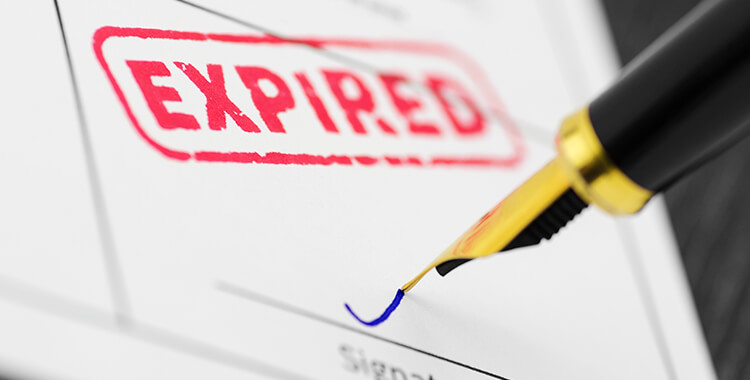
Numerous times a year, landowners call my office and explain that their oil and gas lease has expired but they’ve been told by the oil and gas company that it hasn’t. Sometimes, it’s easy for me to verify whether an oil and gas lease has expired or not. Other times, it requires a great deal of time and research to come to a conclusive opinion. Still, on other occasions, there is a legitimate disagreement between myself and the oil and gas company that cannot be resolved without a lawsuit.
The Term of Your Oil and Gas Lease
As a starting point, the typical term of an oil and gas lease in West Virginia, Ohio, and Pennsylvania is 5 years. The time starts on this 5 years on the date you sign your lease (even though you will likely have to wait 120 days or more to receive your bonus payment). The typical lease states that if the oil and gas company “commences operations” for the search of oil or gas within those 5 years, the lease is “held by production” for so long as operations continue and production is established.

If the oil and gas company does not “commence operations” within those 5 years, the company will typically have the right to extend or renew for an additional 5-year term and pay an extension payment. Normally, the extension payment is the same amount as the initial bonus payment. And, just as in the initial 5-year term, if the oil and gas company “commences operations” within the 5-year extended term, the lease is “held by production” indefinitely. That is why oil and gas leases are sometimes referred to as 5+5 leases within the oil and gas industry—5 years for the initial term and 5 years for the extended term.
Some people think that their lease will expire no matter what at the end of the 5-year initial term and/or the 5-year extended term. As you’ve just read, that’s not accurate. If the oil and gas company “commences operations,” the oil and gas lease will be effective as long as there is production.
When Has an Oil and Gas Company “Commenced Operations”?
That’s not always an easy question to answer. I like to think of it as a spectrum. On one end of the spectrum, the oil and gas company has surveyed for a well pad that would produce your property and that is it. On the other end of the spectrum, a gas well has been drilled and there is production of oil and gas from your property. Under the terms of many oil and gas leases in the Ohio Valley, the act of surveying a well pad is not enough for an oil and gas company to have “commenced operations.” On the other hand, if a gas well has been drilled and there is production, that is extremely likely to be enough for an oil and gas company to have “commenced operations.” Of course, the vast majority of scenarios fall somewhere in the middle of the spectrum, and it’s not so cut and dry as to whether the oil and gas company has “commenced operations.”
Whether an oil and gas company has “commenced operations” for your property is thus a very fact-intense inquiry. It involves a close reading of the language of your lease. What specifically does the oil and gas lease require? The meaning of your oil and gas lease could turn on a word or two. Moreover, what activities the oil and gas company has performed and what dates those activities were performed are of extreme importance. That involves not only a great deal of research using various public resources, but it requires knowledge of the industry. Why? Not everything an oil and gas company does is publicly available.
What I do to Determine whether an Oil and Gas Lease has Expired
The starting point is always the language of the oil and gas lease. What is the effective date of the lease? Is it a 5+5 lease or was something else negotiated? Have 5 years passed since the initial signing of the oil and gas lease (or 10 years for an extended term)? Assuming it has (or will in the near future), what does the oil and gas lease say about commencing operations? This doesn’t take long at all.

Then, I focus my attention on whether there is any activity regarding the property subject to the oil and gas lease. Has a well work permit application been filed with the WV Department of Environmental Protection? Has the oil and gas company performed any physical activity to drill a well? That is, have they surveyed for a well pad? Have they leveled a well pad? Have they moved equipment and machinery on site to spud a well? Has a well been spudded? Have they fracked? Has a well been completed? What dates did all of these different events occur?
This is where the vast majority of my time is spent on these matters. The answers to many if not most of these questions are not publicly available. And, if they are, it’s not easily available. It takes someone with knowledge and experience of the oil and gas industry to gather all of the necessary information and make educated guesses to fill in the blanks for the information that is simply not accessible.
I then review all of this information against the language of the oil and gas lease and come to an opinion as to whether I think the lease has expired or whether the oil and gas company has “commenced operations.” I then give my opinion to my client and discuss their options. If I feel as if we can make a case that the oil and gas company has not commenced operations and the oil and gas lease has expired, I’ll contact the company to demand a release of the oil and gas lease. Sometimes, I am able to obtain the release or otherwise resolve the dispute to my client’s satisfaction. Other times, the oil and gas company will let me know that it does not agree, and a lawsuit will have to be filed.
We Can Help
Over the last few years, I’ve successfully litigated many of these cases on behalf of West Virginia and Ohio landowners. Through those lawsuits, I have been able to obtain new oil and gas leases for my clients. The benefit to my clients cannot be understated. In addition to new bonus payments that can be six figures or more, I’m also able to negotiate higher royalty rates and royalty language that prohibits deduction for post-production expenses or significantly limits the company’s ability to deduct. That alone can mean millions of dollars in royalty payments.

If you believe your oil and gas lease has expired, call GKT today at (304) 845-9750 or live chat with a representative 24/7 at GKT.com. I’d be happy to schedule a free, no-obligation consultation at your convenience.


